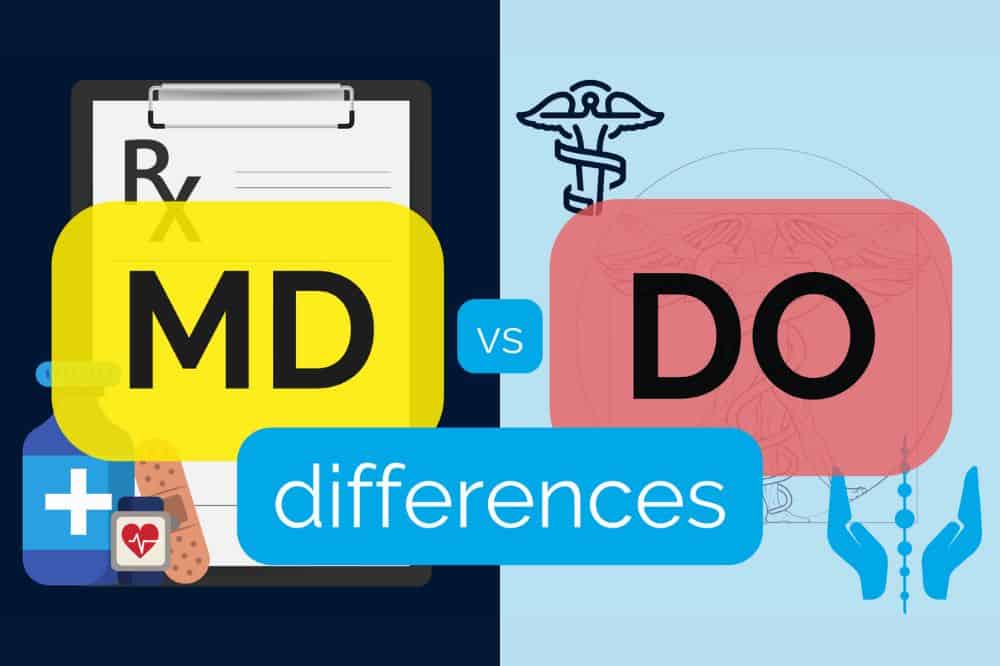If you’re interested in pursuing a career in medicine, there are several options to consider when it comes to selecting a medical school degree. Both a Doctor of Medicine (MD) and a Doctor of Osteopathic Medicine (DO) degree will allow you to practice medicine as a physician in the United States.
What is the main difference between an MD and DO? Both MDs and DOs are fully qualified to practice medicine. The primary difference between MD and DO medical doctors lies in their fundamental philosophies — MDs practice allopathic medicine (treating disease) and DOs take a more holistic approach to healthcare (prevention of disease and emphasizing overall wellness).
Throughout this article, we’ll take a closer look at the similarities and differences between DO and MD degrees, so you can make an informed decision about which graduate medical education is best for you.

What is a DO?
DO stands for Doctor of Osteopathic Medicine, and the DO degree is granted by an osteopathic medical school.
DOs emphasize preventative, holistic medicine based on these tenets:
- The body is a unit: the human body is viewed as an integrated unit, with all of its systems working together to maintain health.
- The body has self-healing mechanisms: the body is capable of healing itself, given the right conditions and support.
- Treatment should focus on the root cause: Osteopathic medicine aims to identify and treat the underlying cause of a disease or condition, rather than just treating the symptoms.
- Prevention is key: Osteopathic physicians emphasize preventive medicine, with a focus on healthy lifestyle habits and early intervention to prevent disease and injury.
- Osteopathic manipulative medicine: Osteopathic physicians use their hands to diagnose and treat injuries and illnesses, using techniques such as joint mobilization, stretching, and massage.
DOs attend medical schools with similar curricula to that of traditional MD programs, plus an additional 200 hours of training in Osteopathic Manipulative Medicine (OMM).
OMM, also called Osteopathic Manipulative Treatment (OMT), is a hands-on technique used to diagnose and treat a range of musculoskeletal conditions, from minor headaches to severe back pain. It may be used in conjunction with or in place of medication.
According to Dr. Tyson DeLengocky, DO, “OMM incorporates aspects of traditional manual therapy, soft-tissue massage therapy, and other body-based modalities to relieve pain from strained muscles, tendons, and joints and improve motion and function of blood circulation, lymphatic and respiratory systems.”
Are DOs the same thing as chiropractors? No. While both DOs and chiropractors are trained to manipulate the musculoskeletal system, DOs can prescribe medicine, perform surgery, and practice primary care. Chiropractors do not have to attend medical school and focus mainly on bone alignment.
Pros of Pursuing a DO:
- DO providers emphasize the importance of taking into account a patient’s lifestyle, environment, and emotional health for a whole-person approach that emphasizes the connection between the mind and body.
- DOs have a range of career opportunities, including primary care, sports medicine, and pain management, among others.
- DOs are trained to use hands-on techniques to diagnose and treat a range of conditions, which appeal to patients hesitant to take medications.
Cons of Pursuing a DO:
- DO programs may not be as well-known or widely recognized as MD programs.
- Some patients may have misconceptions about osteopathic medicine, assuming it is less effective or less rigorous than traditional medicine.
- DO programs do not offer as many specializations as MD programs.
What is an MD?
An MD degree is a traditional medical degree that focuses on the diagnosis and treatment of illnesses and injuries. The curriculum for MD programs is based on scientific principles and focuses on a range of medical specialties, such as cardiology, oncology, or pediatrics.
Once they have completed their medical education, MDs can pursue careers in private practice, academic medicine, research, and public health.
Pros of Pursuing an MD:
- MD programs have a strong emphasis on scientific research and evidence-based medicine.
- MDs have a wider range of career opportunities, including highly specialized medical fields.
- MD programs are more widely recognized and understood by the general public.
Cons of Pursuing an MD:
- MD programs can be highly competitive and expensive.
- MD programs are less likely to focus on preventative medicine
- MDs are more likely to prescribe medication as the primary or only form of medical care.
MD vs. DO Education
Both an MD and a DO are considered physicians, with several differences when it comes to their educations.
Is a DO a higher degree than an MD? No, both DO and MD degrees are equivalent accreditations and provide the same level of authority and responsibility to practice medicine. The main difference between the two is the philosophy and approach to medicine they bring to their practice.
MDs generally follow a more traditional, allopathic approach, which is centered around treating disease. DOs, on the other hand, emphasize a more holistic, osteopathic approach that focuses on disease prevention and healing. Pre-med students should choose one degree or the other depending on which philosophy they prefer and other factors like GPA and MCAT score.
Pre-Med Education
Both MD and DO med school programs will require a four-year bachelor’s degree, as well as academic success in coursework and on the Medical College Admission Test (MCAT).
Read Next: A Guide To Medical Schools That Don’t Require The MCAT
Medical School Admissions
The average GPA and MCAT scores of those who matriculate at DO schools are 3.6 and 505 respectively, compared to 3.75 and 512 for MD matriculants. DO schools tend to accept more non-traditional students whose admissions statistics may not be as strong but include extensive life and/or pre-med experiences.
Tests and Licensing
Within the MD and DO disciplines, students must undergo different medical licensing examinations. MD students take the USMLE, while DO students must take the COMLEX exams.
What to Know About Residency Programs
DO medical students can obtain MD residency positions, and the residency match process is the same for both DO and MD students.
The National Resident Matching Program (NRMP), also known as “the Match,” is a system that matches medical students with available residency positions. Both DO and MD medical students participate in this process and are evaluated based on the same criteria. However, DO students may face some unique challenges in matching with certain highly competitive specialties, as there may be a preference for MD applicants in some programs.
Nevertheless, DO students have successfully matched in a wide range of specialties and programs, and many residency programs actively seek out and value the unique training and perspective that DOs bring to the practice of medicine.
MD vs. DO — Salary
The income of DOs versus MDs can vary drastically. DOs tend to enter general fields like family medicine and internal medicine, which are two of the lowest-paying specialties. MDs, on the other hand, may prefer to specialize in competitive fields like dermatology, cardiology, and surgery, which are some of the highest paying.
DOs, however, are just as capable of earning a salary on par with their MD counterparts. It’s not the degree that limits their earning potential — it’s the specialty they opt into.
Ultimately, a DO and MD both specializing in dermatology, and practicing in the same area, would earn about the same amount.
How Do I Decide Between Pursuing an MD or a DO?
Making the choice between pursuing an MD vs. DO education is a personal decision. You must evaluate your life goals and interests to see which philosophy of medicine is the best path for you.
If you imagine yourself working at a prestigious hospital in a competitive specialty tackling rare medical cases, an MD could be the better choice.
If you’re looking to treat common illnesses, promote overall wellness, and become a figure of trust in your local community, a DO might be the path for you
What Are My Degree Options Beyond MD and DO?
Ensure you’re making the most informed choice by considering all your medical school options. The MD/PhD is another track you’ll want to consider.
And if you’re pursuing an MD, but you aren’t interested in patient care, check out this resource: Beyond Patient Care – Other Uses for an MD.
Help Applying to Medical School
We’ve given you a lot to think about when it comes to making a decision about medical degrees while applying to medical school. But we’re also here to offer more help.
Schedule a free 15-minute consultation with our friends at MedSchoolCoach to learn how they can help boost your chances of success getting into medical school.



